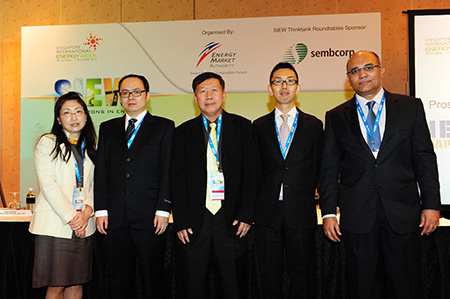
(From left to right) Ms Yukari Yamashita, Board Member and Director of the Energy Data and Modeling Center at Japan’s Institute of Energy Economics; Dr Liu Yu, Senior Consultant with ACTSYS Process Management Consultants; Mr Phongjaroon Srisovanna, Executive Director of the Energy Conservation Center of Thailand; Mr Toshiharu Hiramatsu, Technical Adviser with Azbil Singapore Pte Ltd; and Mr Ram Bhaskar, Director of the Singapore National Environment Agency’s Energy Efficiency and Conservation Department, sounded the call for more regional collaboration to drive energy efficiency in Asia.
Japan is already a leader in energy efficiency practices but the country is now looking to do more and has turned its attention to “peak shifting”. This refers to encouraging consumers to shift energy demand away from peak periods when costs tend to be higher, and into off-peak periods, so as to flatten out the overall energy demand profile and reduce energy costs.
Ms Yukari Yamashita, Board Member and Director of the Energy Data and Modeling Center at the Institute of Energy Economics, Japan, highlighted this latest initiative in Japan’s energy efficiency drive at a SIEW 2013 roundtable yesterday to discuss the prospects for energy saving potential in Asia.
With Asia set to be one of the fastest growing regions in terms of energy demand, energy efficiency and conservation will be a key plank of national energy policy, and to help formulate this, said Ms Yamashita, “collaboration [between] the government ministries and industry is essential.”
Her fellow panellist Mr Ram Bhaskar, Director of the Singapore National Environment Agency’s Energy Efficiency and Conservation Department, highlighted an example of such collaboration in Singapore. Mr Bhaskar spoke about the industry-focused Energy Efficiency National Partnership (EENP) scheme launched three years ago that was jointly developed by three government agencies to help companies be more energy-efficient and drive their long-term business competitiveness.
Reward-based incentives were important drivers of energy efficiency practices, and examples of how they had been rolled out in Japan, Singapore and Thailand were cited by Ms Yamashita; Mr Bhaskar; and their fellow panellist Mr Phongjaroon Srisovanna, Executive Director of the Energy Conservation Center of Thailand. Dr Liu Yu, Senior Consultant with ACTSYS Process Management Consultants; and Mr Toshiharu Hiramatsu, Technical Adviser with Azbil Singapore Pte Ltd, shared the industry’s perspective on how the private sector could support national energy efficiency efforts.
Ms Yamashita pointed out that Japan has a policy of “praising these industries which have made effort to cut or shift their electricity consumption away from targeted periods, for example the summer or winter peak times.” In a similar vein, Singapore recognises companies and individuals for their energy management practices through the annual EENP Awards. And in Thailand, a slew of financial incentives are made available, ranging from tax incentives to a government co-investment scheme for energy service companies.
Mr Srisovanna added that more would have to be done, citing training in energy management as one area that could be improved. Thailand requires such training for its 6,000 designated factories and buildings, and is looking to eventually implement Energy Performance Certificates as a mandatory scheme to reduce energy consumption in large industries. Singapore has over the last few years introduced enhanced training schemes and certification for energy managers and introduced an Energy Conservation Act earlier this year in April, requiring among other things, certified Energy Managers to be appointed.
Beyond the industrial sector, Ms Yamashita stressed that i
t was also important to look at the commercial and household sectors, where consumption data could be made available to encourage consumer behaviour towards more energy efficient practices.
Asia/World Energy Outlook – Institute of Energy Economics, Japan
BY : Yeo Yong Kiat, EMA